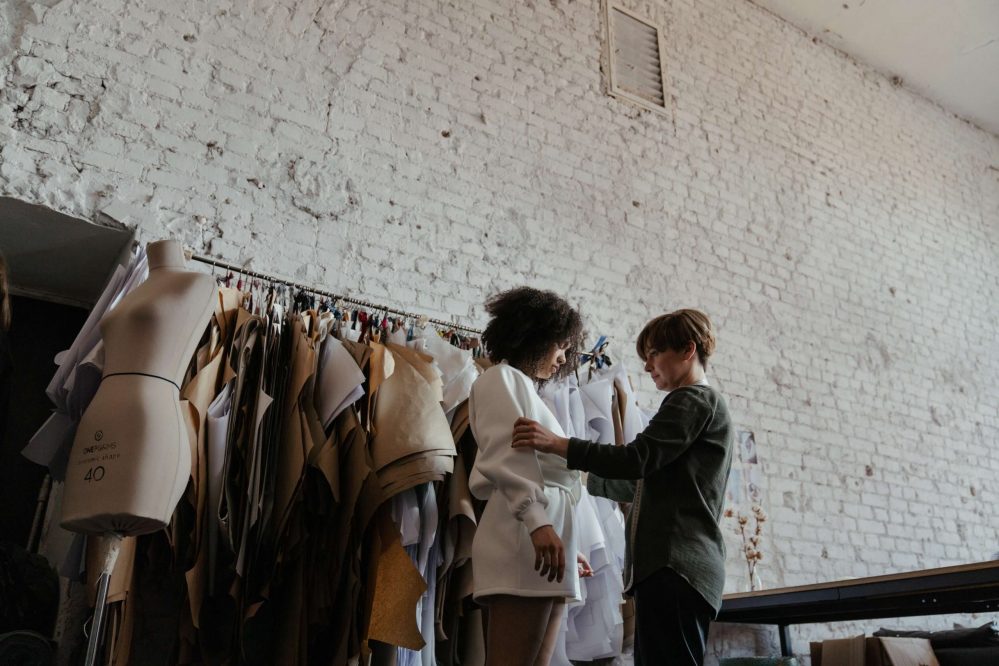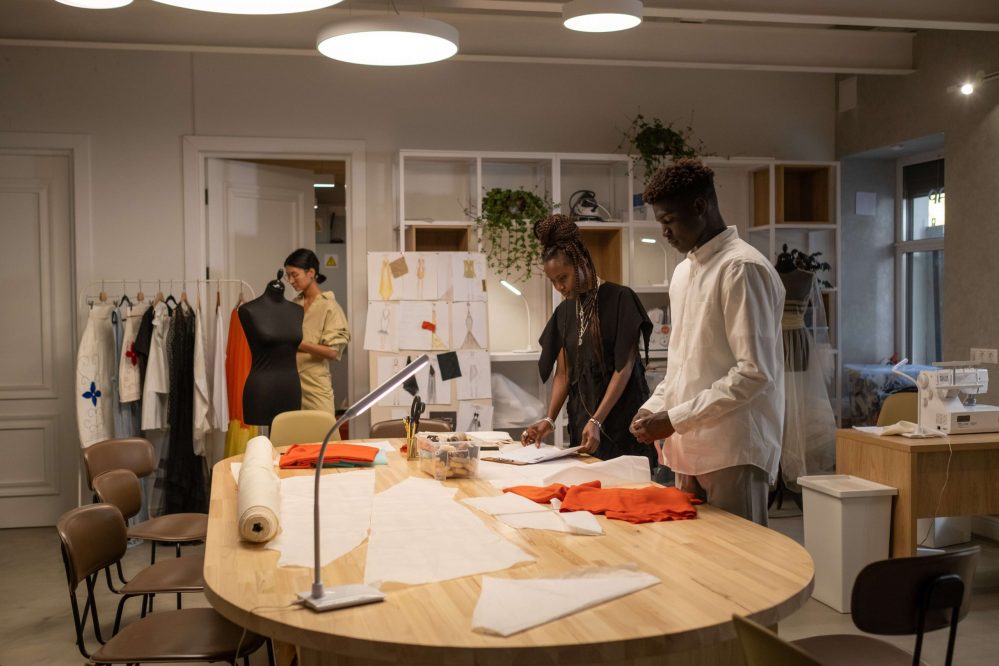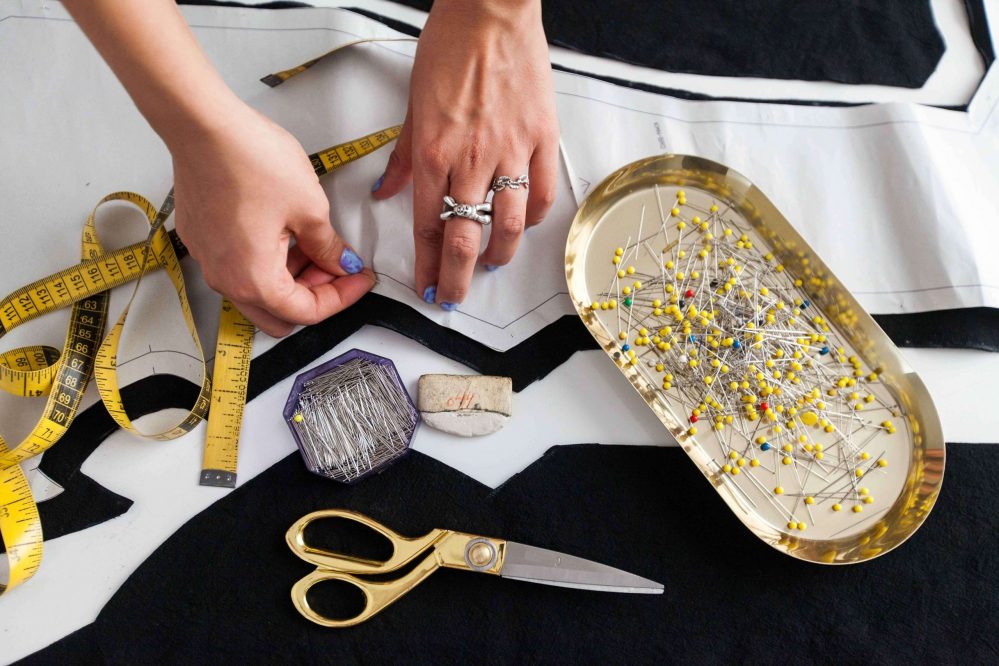Embarking on a career in the fast-paced, ever-evolving world of fashion design can be as exciting as it is challenging. One of the most frequently asked questions by aspiring designers is whether they need a degree for a fashion designer role.While creativity and innovation are essential in this field, formal education often provides an advantage, preparing individuals to excel in various aspects of the fashion industry.
This article explores what it means to be a fashion designer, the value of pursuing a degree in fashion design, and the necessary skills to thrive in this competitive landscape It’s time to unravel the thread of this captivating career and determine how a degree as a fashion designer can shape your pathway to success in the sartorial world.
What Is a Fashion Designer?
 A fashion designer designs and creates clothes, costumes, accessories, footwear, etc. These items can be designed for women, men, children, and animals so that you can specialize in one area. And since this is already a competitive field, focusing on one niche can improve your chances of becoming a well-known designer.
A fashion designer designs and creates clothes, costumes, accessories, footwear, etc. These items can be designed for women, men, children, and animals so that you can specialize in one area. And since this is already a competitive field, focusing on one niche can improve your chances of becoming a well-known designer.
Many fashion designers create their pieces so they can sell them, while others are hired to draw sketches or design clothes for a brand. They can choose to do so anonymously, so no one knows who’s behind those fabulous pieces.
What Degree Do You Need To Be A Fashion Designer?
 Apart from having artistic abilities, you should also get a degree if you want to benefit. It may not seem necessary in the beginning, but when you start looking for a job, and you’re faced with intense competition, that’s when you know you should’ve taken the college route.
Apart from having artistic abilities, you should also get a degree if you want to benefit. It may not seem necessary in the beginning, but when you start looking for a job, and you’re faced with intense competition, that’s when you know you should’ve taken the college route.
With this being said, going to college for a fashion design degree is not obligatory, but it does help you in many ways. According to the Occupational Information Network (ONET), 36% of fashion designers have an associate degree, while 24% have a bachelor’s. So students interested in going to college should earn a bachelor’s degree in fashion design or merchandise.
Although many fashion designers reported not having a bachelor’s degree, the Bureau of Labor Statistics (BLS) shows that career opportunities are more promising for designers who have a four-year degree.
What do you learn in a BA in fashion design?
 A bachelor’s degree in fashion design allows students to take courses in fashion history, pattern making, computer-aided fashion design, figure drawing, sketches, and more. Additionally, fashion designers can complete a degree in fashion merchandising, management, merchandise planning, consumer behavior, and product development.
A bachelor’s degree in fashion design allows students to take courses in fashion history, pattern making, computer-aided fashion design, figure drawing, sketches, and more. Additionally, fashion designers can complete a degree in fashion merchandising, management, merchandise planning, consumer behavior, and product development.
Besides sketching and designing original products, fashion designers can also study the fashion industry to stay informed of the latest trends and predict future styles. This means that designers with bachelor’s degrees also gain hands-on experience through internships or assistant positions, creating their portfolios.
How long does it take to graduate in fashion design?
Associate’s degree programs in fashion design don’t take too long. Usually, they’re 2-year programs that equip you with basic technical design skills, such as sewing, fundamental fashion theories, and tailoring.
However, bachelor’s degree programs in fashion design last longer, up to four years. They provide more thorough career training, combining artistic and conceptual instruction with technical coursework. These courses include 3D design, fashion drawing, textiles, color theory, fashion business, and portfolio presentation.
What are some fashion design specializations?
 The fashion industry is already broad, so designers should pick a specialization area they’re good at and focus their entire work in that niche. Fashion designers can choose from specializations, including women’s, men’s, sportswear, swimwear, and accessories design.
The fashion industry is already broad, so designers should pick a specialization area they’re good at and focus their entire work in that niche. Fashion designers can choose from specializations, including women’s, men’s, sportswear, swimwear, and accessories design.
Students can choose their courses based on what they plan on specializing in. Some common course specializations include:
- Mass market fashion,
- Athletic wear,
- Eco-fashion,
- Fashion technology,
- High-end fashion,
- Prep-a-porter fashion (ready-to-wear).
What Skills Do You Need To Succeed As a Fashion Designer?
 Besides being creative, fashion designers should have skills that will help them succeed in the market. Every individual has unique skills which set them apart from other fashion designers. The skills below are crucial to gaining success in the fashion industry.
Besides being creative, fashion designers should have skills that will help them succeed in the market. Every individual has unique skills which set them apart from other fashion designers. The skills below are crucial to gaining success in the fashion industry.
- Artistic creativity: The most critical skill for a fashion designer or an artist is to be creative and artistic because you want your art to be distinguishable from others. Many fashion designers had careers as graphic designers, architects, or related fields before starting with fashion.
- Communication skills: Any fashion designer who wants to succeed must know how to communicate if they’re going to develop their brand. When you’re working with teams, you can show them your ideas; listen to what your teammates say so you provide effective feedback. As you step foot in this career, you will have plenty of opportunities to be a part of a design team or create one of your own.
- Sewing and drawing skills: Sewing is a basic skill that any fashion designer should have. You shouldn’t necessarily know how to use a sewing machine, but any potential client or designer would be highly impressed if you sew your designs.
- Distinguishing different fabrics and materials: Understanding your fabrics and materials doesn’t require too much time. You can familiarize yourself with them by touching and feeling the fabrics, changing the tension of different stitches, and working with embroidery. You can watch online tutorials, read craft books, or take technical classes.
How To Become A Fashion Designer?
 If you have creative and artistic abilities, you’re one step ahead of becoming a fashion designer. However, other things are necessary to break into the business, such as getting a formal education, some work experience, and other essential items.
If you have creative and artistic abilities, you’re one step ahead of becoming a fashion designer. However, other things are necessary to break into the business, such as getting a formal education, some work experience, and other essential items.
Get a degree
A degree in fashion is not obligatory but always helpful. If you want to own your brand or work with well-known fashion designers, getting a degree in any fashion-related area can help you. For example, you can have a bachelor’s degree in fashion design, visual arts, or art history or take a short course in design.
These programs and courses will teach various design and communication skills necessary to thrive in the industry. They also provide specialization courses if you want to focus on one area of fashion.
Get an internship or work experience
Hands-on training is essential for gaining a spot in fashion design. Aspiring fashion designers can gain experience through internship programs which you can find at design companies and retail businesses. These internships allow you to apply your skills and knowledge while compensating for your work.
Of course, there’s a chance that you won’t start working right after you graduate from college, but you gain experience by working as a sketching assistant or pattern maker at first, so you move on to your bigger goal – a fashion designer.
The salary is not bad either. On average, a fashion designer in Switzerland earns approximately CHF 100’498.
Create your portfolio
If you want to show off your talent to potential employers or clients, you need to create a portfolio where you can show your creative skills. A portfolio allows you to showcase various skills, such as sewing, sketching, drawing, and pattern-making abilities. As a student, you can start by filling your portfolio with your work during your program.
Create your network
The power of networking leads to new job opportunities. Knowing many people is essential so you can find out whenever there’s a new job application.
One way of doing this is attending events and meeting new people you may want to do business with, such as stylists, retailers, buyers, merchandisers, or models.
The Bottom Line
Working as a fashion designer can be exciting and glamorous, but there are steps along the way that can make or break your journey. You must have a strong capacity for d tail and style, whether you choose to work for yourself or private clients. It takes a lot of time and effort, but there are many career opportunities you can benefit from.
FAQs
Can someone without any formal education in fashion become a fashion designer?
While a degree in fashion or related field is not obligatory, it significantly helps to understand the technicalities, business side, and latest trends in the industry. Many successful fashion designers have formal education in fashion, art, or design. However, if someone is extremely talented, diligent, and connected, they might be able to succeed without formal education, though it can be more challenging.
What kind of job roles can I expect to start with in the fashion industry?
Entry-level roles in the fashion industry might include positions like pattern makers, sketching assistants, textile designers, or junior designers. These positions provide hands-on experience and understanding of the fashion industry’s workings, which are essential for becoming a successful fashion designer.
How essential is it for a fashion designer to keep up with the trends?
Fashion is a constantly evolving field. A successful fashion designer should not only keep up with the current trends but also anticipate future styles and trends. Understanding the market, consumer behavior, and recent developments in the industry is crucial to create designs that appeal to the audience.
How can a fashion designer make their work more sustainable?
Sustainability is a growing concern in the fashion industry. Designers can contribute by using sustainable materials, reducing waste in their production processes, designing for longevity, and educating consumers about sustainable fashion. Specializing in eco-fashion could also be a niche to consider.
Is it necessary for a fashion designer to know how to sew?
Sewing is a fundamental skill in fashion design. Even though it might not be required for every design role, understanding how clothes are constructed will improve a designer’s ability to create functional and innovative designs. It can also impress potential clients and employers.
How important is networking in the fashion industry?
Networking is crucial in the fashion industry. It can lead to collaborations, job opportunities, and increased visibility. Attending industry events, fashion shows, and exhibitions are good ways to meet other professionals in the field.
How can I protect my designs from being copied?
Designers can protect their designs by understanding and utilizing intellectual property rights, such as copyrights, patents, trademarks and trademark registration. Registering your designs and keeping detailed records of your design process can also help provide evidence in case of any disputes.
Is it more advantageous to specialize in one type of fashion design or to have a broad range?
Specializing in one type of fashion design can allow a designer to become an expert in that area and target a specific market niche. On the other hand, having a broad range can offer more variety and flexibility. The choice would depend on the designer’s skills, interests, and career goals.
What are some challenges that a fashion designer might face?
Some common challenges for fashion designers include coping with fast fashion cycles, maintaining creativity under pressure, staying ahead of trends, sourcing sustainable materials, and dealing with competition in the industry.
How can a fashion designer stand out in such a competitive industry?
Having a unique and authentic style, mastering technical skills, keeping up-to-date with the latest trends, networking effectively, and gaining practical experience in the industry can all help a fashion designer stand out. Having a compelling portfolio that showcases your style and skills is also essential.


